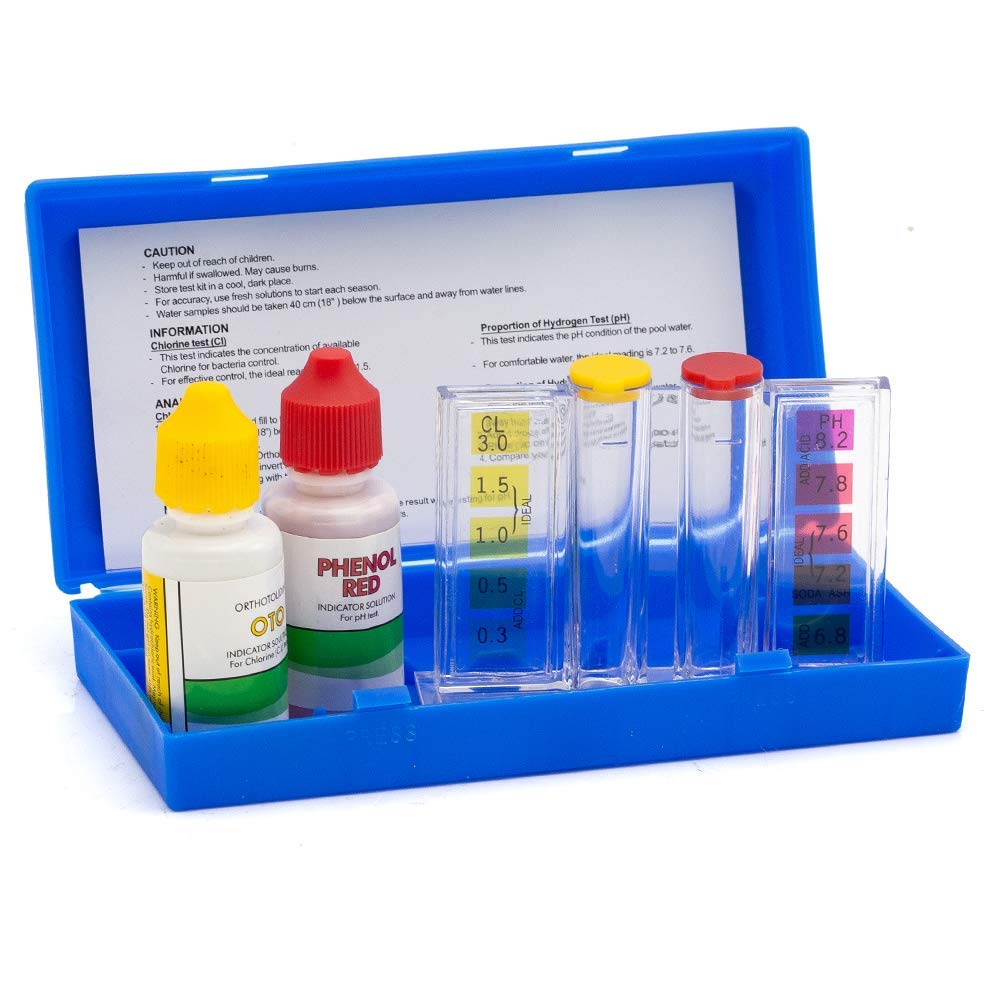Maintaining a pristine pool is essential for both enjoyment and health, and a best pool test kit plays a crucial role in this process. With the right kit, you can ensure that your pool remains in perfect condition all year long, safeguarding your investment and your swimmers.
Regular water testing is not just about clarity and cleanliness—it’s a critical safety measure. A good pool test kit can prevent algae growth, eliminate harmful bacteria, and balance chemicals, making the difference between a sparkling oasis and a murky pond.
Why is it important to test your pool water regularly?
Testing your pool water is essential for several reasons. First, it helps maintain the ideal balance of chemicals, which is necessary for preventing bacteria and algae growth. Second, regular testing ensures the safety of swimmers by identifying any potential chemical imbalances that could cause skin or eye irritation. Finally, it helps extend the life of your pool by protecting its surfaces and equipment from damage due to improper water conditions.
Chemical balance is vital for avoiding costly repairs and ensuring the longevity of your pool. For instance, incorrect pH levels can lead to corrosion or scaling, while inadequate sanitizer levels can allow pathogens to thrive. By using a best pool test kit for saltwater pool maintenance or a best digital pool test kit for convenience, you can easily monitor your pool’s health.
Moreover, understanding water chemistry helps you make informed decisions on how to treat your pool. Whether it’s adjusting the chlorine levels or adding algaecide, the results from your test kit serve as a roadmap for a clean and clear pool.
How often should you test your pool water?
The frequency of testing your pool water can vary depending on usage, the environment, and the type of pool you own. For a standard guideline, it’s recommended to test at least once a week during the swimming season. However, if your pool sees heavy use or if it has been subject to heavy rainfall, more frequent testing may be necessary.

For pools with heavy traffic or those exposed to significant amounts of leaves and debris, it’s wise to test the water two to three times a week. Keeping a close eye on your pool’s chemistry will enable you to react quickly to any changes and prevent problems before they escalate.
Particularly, saltwater pools may require different testing frequencies. Because they generate their own chlorine, you’ll want to ensure the generator is functioning correctly by testing more frequently than traditional chlorine pools.
During the off-season, you should still test your pool water but can reduce the frequency. Monthly checks are usually sufficient to ensure the water stays balanced and ready for the next season.
What should a pool kit test for?
An effective pool test kit should measure several key parameters to ensure comprehensive water quality management. These include:
- pH levels, to maintain comfort for swimmers and prevent corrosion or scaling.
- Chlorine or bromine levels, for sanitizing the water and neutralizing contaminants.
- Total alkalinity, to stabilize pH levels and prevent sudden shifts in water chemistry.
- Calcium hardness, to prevent plaster damage or scaling.
- Cyanuric acid levels, to protect chlorine from sunlight degradation.
Advanced kits might also test for alkalinity testing and chemical titration, providing a more comprehensive water analysis.
Choosing the best test kit for your pool
Selecting the right pool test kit depends on your specific needs and preferences. For those looking for simplicity and speed, top pool water test strips for quick checks might be the ideal choice. However, if precision is your top priority, consider options like the Taylor pool test kit for accurate results.

When choosing a test kit, consider factors such as ease of use, the range of tests offered, accuracy, and cost. Digital kits like Leslie’s AccuBlue provide quick readings but may require additional costs for subscriptions or replacement sensors.
For serious maintenance tasks, a professional pool test kit might be necessary. These kits offer detailed analyses, which are essential when addressing complex water balance issues.
 Pool lighting ideas: 10 ways to illuminate your backyard swimming pool
Pool lighting ideas: 10 ways to illuminate your backyard swimming poolHow each pool kit was tested
To determine the effectiveness of various pool test kits, a series of tests was conducted. These included assessing accuracy, ease of use, and consistency of results. Users also took note of how comprehensive the instructions were, the durability of the components, and the customer support provided by the manufacturer.
Kits that utilized FAS-DPD titration, like the Taylor K-2006, were held to higher accuracy standards due to their precise measurements. Digital testers and photometric kits were evaluated for their response time and the clarity of their digital displays.
Additionally, the practicality of the kits was assessed. This involved considering the portability of the case, the ease of obtaining replacement reagents, and the overall user experience.

The bottom line on pool test kits
Finding the appropriate pool test kit is a crucial step in maintaining a healthy pool environment. Whether you opt for a simple strip test or a sophisticated digital reader, the key is to select a kit that you will use consistently and correctly.
Remember, the goal is to keep your pool in perfect condition, not just in the summer but all year long. By choosing the best pool test kit, you can ensure a safe and inviting swim for everyone.
Ultimately, the right pool test kit is the one that meets your specific needs, is within your budget, and provides reliable results. With the right tools and a regular testing schedule, your pool will remain a refreshing retreat for years to come.
Preguntas relacionadas sobre pool test kits
Why is it important to test your pool water regularly?
Testing your pool water consistently is crucial for balancing the chemicals and ensuring the health and safety of swimmers. It helps identify and correct imbalances that could lead to harmful bacteria, algae growth, and uncomfortable swimming conditions.
Moreover, regular testing can save you money in the long run by avoiding damage to pool surfaces and equipment caused by improper water chemistry.
How often should you test your pool water?
You should test your pool water typically at least once a week during peak swimming seasons. However, if your pool is used heavily or after significant weather events like rainstorms, you might need to test the water more frequently.

During the off-season, monthly tests are usually adequate to keep the pool water balanced and ready for use when the weather warms up again.
What should a pool kit test for?
An ideal pool test kit should check for pH levels, chlorine or bromine, total alkalinity, calcium hardness, and cyanuric acid. Some may also measure other factors like metal content or total dissolved solids for a more detailed analysis.
What are the best pool test kits available?
The best pool test kits include options like the Taylor K-2006, known for its accuracy and comprehensive testing capabilities, and digital testers such as Leslie’s AccuBlue for quick and easy readings.
What is the best digital pool test kit?
The best digital pool test kit for you will depend on your specific needs. Digital kits like Leslie’s AccuBlue are praised for their ease of use and rapid results, making them a popular choice for those prioritising convenience.
 Deadheading dahlias: what to do when your blooms fade
Deadheading dahlias: what to do when your blooms fade
